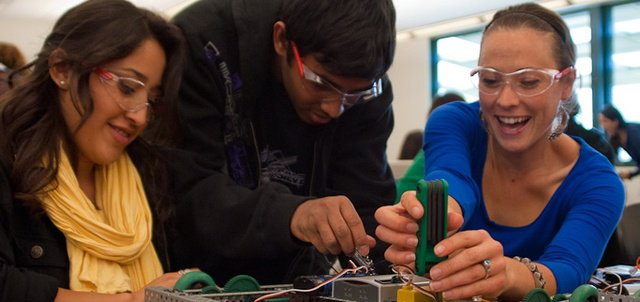
ChatGPT: The AI Language Model Revolutionizing the Way We Communicate
ChatGPT is a cutting-edge AI language model that is transforming the way we communicate with machines. Developed by Open...

When it comes to innovation, most universities today advance cutting-edge change through the powerful and profound science and technology research generated by their faculty members. Clearly, these groundbreaking efforts have altered our world in a multitude of positive ways, so we must keep funding them in order to sustain progress as a society.
But higher education needs to also embrace and implement another thoughtful approach to innovation -- one that’s more student-centric, team-oriented, solutions-focused and cross-discipline driven.
This is the ideathon, a short, intensive, workshop-like experience that enables students to address some of the most pressing challenges of our time. Participants work in teams and use design thinking and innovative learning practices to ideate and collaborate on a host of possible solutions. And the best ideathons combine students from many majors - a biology student working together with a linguist, drama student and public policy major, for example. The wider the cross-section of students involved, the more perspectives there will be in the solution process.
Based on tried-and-true innovation practices, ideathons -- like hackathons and start-up weekends -- engage and motivate participants in a creative and connected manner. This helps everyone involved feel like they have a stake in the solution or outcome. In addition, because ideathons rely on short-bursts of intellectual energy, the pace of invention and inventiveness is quick. Ideas are created, discarded and revised in rapid-fire fashion, which results in cycles that almost always offer a broad range of possible answers to critical questions.
This new form of learning and innovating must be incorporated and integrated into the existing educational infrastructure at universities in order to truly fulfill its potential. It also has to demonstrate the requisite academic rigor and necessary research depth. And in a world in which online education is only increasing, can an ideathon structure work without the spark and immediacy of actual face-to-face collaboration?
Despite these questions and challenges, there is early indication of the productivity of ideathons as a complementary innovation driver to disciplinary curricula and research.
At the University of Washington, where we work, for example, we’ve launched the "C21 + CoMotion Ideathon," which is designed to provide our students with an intense experience in design thinking innovation, while helping them build the collaborative, critical thinking and communication skills that are in high demand by employers today. In early April, for example, students came together for a multi-day ideathon in an effort to re-design the Humanities experience across the UW campus.
The University of Waterloo in Canada recently staged the WIMIn Ideathon, a two-day event aiming to connect, inspire and explore the potential of women across disciplines while helping them seed or grow innovative ideas.
In late February, the University of Toronto sponsored an ideathon designed to tackle the world’s toughest health problems. And last year, an ideathon at Harvard Law School brought together some of the brightest minds in development to create innovative and sustainable solutions to improve water quality, sanitation and hygiene in Ghana.
One of the most important take-aways from the burgeoning ideathon movement is that students in liberal arts and humanities can play a significant role in our innovative future; it’s not just the scientists and technologists who get to define the 21st century, and even more importantly address the challenges facing humankind and the world, although their substantial contribution is undeniable.
This is especially important to the business community, because legions of mundane jobs will be replaced by machine learning in the coming decades, and bright, adaptive and resourceful young employees who can quickly synthesize lots of disparate information will become even more valuable.
Indeed, as basic programming gradually becomes more of a basic and potentially a commodity discipline, broad creativity will be at a premium in companies everywhere. As a result, innovative university ideathons, which spawn and stimulate ingenuity, can start shaping the next-generation workplace now.

ChatGPT is a cutting-edge AI language model that is transforming the way we communicate with machines. Developed by Open...

Climate change affects us all, but we still are not acting as quickly as we should to address its causes, mitigate the d...

Children education has not been able to get the due priority it deserves during disaster responses, with only 2 percent ...